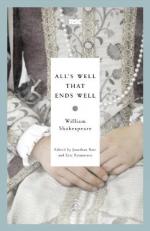|
This section contains 3,226 words (approx. 11 pages at 300 words per page) |

|
SOURCE: “An Ill Marriage in an Ill Government: Patterns of Unresolved Conflict in All's Well That Ends Well,” in Shakespeare-Jahrbuch, Vol. 120, 1984, pp. 97-102.
In the following essay, Bassnett-McGuire suggests that All's Well That Ends Well reflects post-Reformation views of the marriage contract and also comments on the individual's relationship to the state.
All's Well That Ends Well occupies one of the minor positions in the Shakespeare canon, and the map of its critical history reveals a text often held to be problematic, described variously as incomplete or inadequate, and perhaps dismissed most tellingly by Logan Pearsall Smith who declared that “it reads like hack-work.”2 Overall, critical opinions of the play have tended to see it as a flawed text in which disparate element sit uneasily together.
In the eighteenth century a resolution was found by placing emphasis on the farcical elements within the text, and after Garrick's 1756 adaptation...
|
This section contains 3,226 words (approx. 11 pages at 300 words per page) |

|


